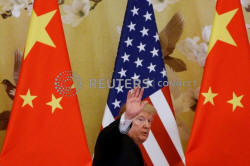Trump says Beijing 'broke' trade talk deals, pledges to
keep tariffs on Chinese goods
 Send a link to a friend
Send a link to a friend
 [May 09, 2019]
By Jeff Mason and David Lawder [May 09, 2019]
By Jeff Mason and David Lawder
PANAMA CITY, Fla./WASHINGTON (Reuters) -
U.S. President Donald Trump said on Wednesday that China "broke the
deal" it had reached in trade talks with the United States, and vowed
not to back down on imposing new tariffs on Chinese imports unless
Beijing "stops cheating our workers."
The U.S. Trade Representative's office announced that tariffs on $200
billion worth of Chinese goods would increase to 25 percent from 10
percent at 12:01 a.m. (0401) GMT on Friday, right in the middle of two
days of meetings between Chinese Vice Premier Liu He and Trump's top
trade officials in Washington.
Speaking to supporters at a rally in Florida on Wednesday, Trump accused
China of breaking the deal and that Beijing would pay if no agreement is
reached.
"I just announced that weíll increase tariffs on China and we wonít back
down until China stops cheating our workers and stealing our jobs, and
thatís whatís going to happen, otherwise we donít have to do business
with them,Ē Trump told a cheering crowd.

"They broke the deal," he added. "They can't do that. So they'll be
paying. If we don't make the deal, nothing wrong with taking in more
than $100 billion a year."
Trump's comments fueled a round of selling in Asian markets
Beijing has announced it would retaliate if tariffs rise.
"The Chinese side deeply regrets that if the U.S. tariff measures are
implemented, China will have to take necessary countermeasures," China's
Commerce Ministry said on its website, without elaborating.
The world's two largest economies have been embroiled in a tit-for-tat
tariff war since July 2018 over U.S. demands that the Asian powerhouse
adopt policy changes that would, among other things, better protect
American intellectual property and make China's market more accessible
to U.S. companies.
Expectations were recently riding high that a deal could be reached, but
a deep rift over the language of the proposed agreement opened up last
weekend.
Reuters, citing U.S. government and private-sector sources, reported on
Wednesday that China had backtracked on almost all aspects of a draft
trade agreement, threatening to blow up the negotiations and prompting
Trump to order the tariff increase.
Trump, who has embraced largely protectionist policies as part of his
"America First" agenda, warned China on Wednesday that it was mistaken
if it hoped to delay a trade deal until a Democrat controlled the White
House.
"The reason for the China pullback & attempted renegotiation of the
Trade Deal is the sincere HOPE that they will be able to 'negotiate'
with Joe Biden or one of the very weak Democrats," Trump, a Republican,
tweeted on Wednesday.
[to top of second column] |

U.S. President Donald Trump waves during joint statements with
China's President Xi Jinping at the Great Hall of the People in
Beijing, China, November 9, 2017. REUTERS/Thomas Peter/File Photo

"Guess what, that's not going to happen! China has just informed us that they
(Vice-Premier) are now coming to the U.S. to make a deal. We'll see, but I am
very happy with over $100 Billion a year in Tariffs filling U.S. coffers," he
added.
In response, Biden's deputy campaign manager, Kate Bedingfield, criticized
Trump, saying on Twitter that U.S. farmers, small-business owners and consumers
were the ones hit by the tariff battle.
Speaking to reporters, White House Press Secretary Sarah Sanders said the Trump
administration had received an "indication" that China wants an agreement.
U.S. stock indexes rebounded slightly from this week's earlier losses after her
comments, but the S&P 500 and the Nasdaq closed in negative territory amid
caution over trade and some disappointing earnings.
SWEEPING CHANGES
Washington is demanding Beijing make sweeping changes to its trade and
regulatory practices, including protecting U.S. intellectual property from theft
and forced transfers to Chinese firms, curbs on Chinese government subsidies and
increased American access to China's markets.
Trump also has sought massive hikes in Chinese purchases of U.S. farm, energy
and manufactured products to shrink a gaping U.S. trade deficit with China.
Sources familiar with the talks said China's latest demands for changes to a
150-page document that had been drafted over several months would make it hard
to avoid the U.S. tariff hike on Friday. That increase would affect Chinese
imports from computer modems and routers to vacuum cleaners, furniture, lighting
and building materials.
Scott Kennedy, a China expert at the Center for Strategic and International
Studies in Washington, said the talks were at a delicate stage and much depended
on what sort of proposal Liu is bringing to Washington.

"I think the Trump administration is quite serious about imposing tariffs,"
Kennedy said. "I don't think Liu He would have agreed to come if he was just
going to give the U.S. a lecture."
(Reporting by Jeff Mason in Panama City, Florida, and David Lawder in
Washington; Additional reporting by Makini Brice in Washington; Writing by Chris
Prentice and David Alexander; Editing by Paul Simao, Lisa Shumaker and Peter
Cooney)
[© 2019 Thomson Reuters. All rights
reserved.] Copyright 2019 Reuters. All rights reserved. This material may not be published,
broadcast, rewritten or redistributed.
Thompson Reuters is solely responsible for this content. |